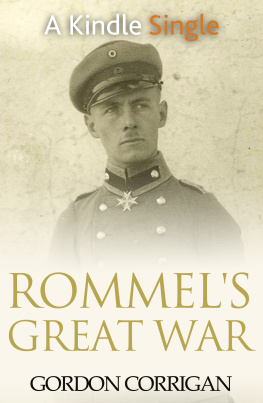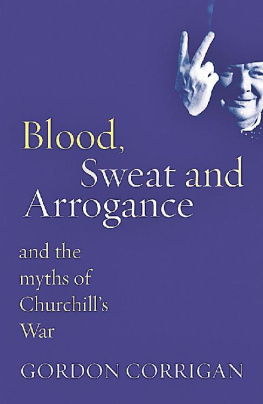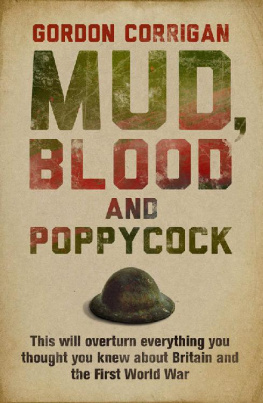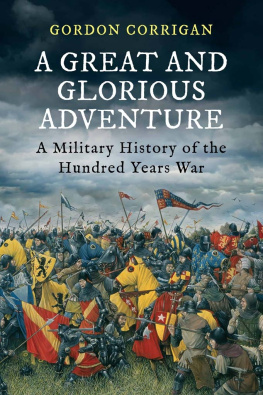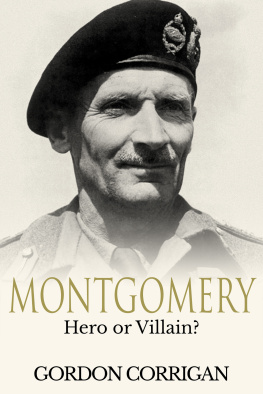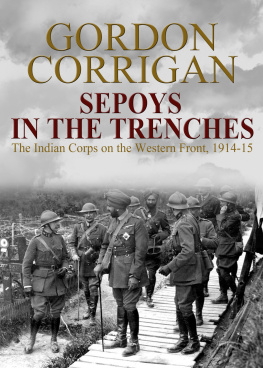ROMMELS GREAT WAR
GORDON CORRIGAN
Gordon Corrigan, 2016
Gordon Corrigan has asserted his rights under the Copyright, Design and Patents Act, 1988, to be identified as the author of this work.
First published by Endeavour Press Ltd in 2016.
Table of Contents
INTRODUCTION
There were nineteen field marshals of the German army who fought in the Second World War, all of whom, at one stage or another, faced the British. But in popular memory it is only one who is remembered, and not only remembered but admired. That one is Erwin Rommel, commander of the first panzer division to reach the channel and capture the British 51st Highland Division in the Battle of France 1940; the general whose Africa Corps ran rings round the British army in North Africa; the man whose portrait his adversary, General Montgomery, kept on his caravan wall; the man who conducted a masterly withdrawal against far superior forces until at last, with the British Eighth Army advancing along the North Africa coast from the East, and the Anglo Americans from the West, Panzer Army Africa had no option but to surrender in Tunisia, but without Rommel who had been ordered back to Germany. He was the commander of Army Group B responsible for the defence of Normandy when Overlord, the invasion of northern Europe by the British and the Americans on 6 June 1944, was launched, and had he been allowed to use the available armour as he wanted, the result of the invasion might well have been different. He may have been involved in the plot to kill Hitler in June 1944, and he was certainly implicated and given the choice of suicide or disgrace. Today, he is the only Second World War commander recognised and lauded by the Federal German army, with a Rommel Regiment and a Rommel barracks situated north of Ulm not far from his birthplace. The West German navy even had a guided missile destroyer Rommel , launched in 1969 by his widow, and decommissioned in 1989.
Rommels wartime career is well remembered. Promoted from colonel to field marshal in three years from 1939, respected by friend and foe he continues to feature in numerous books, films and television programmes, both fact and fiction, but little is generally known about his early years. He was not a product of the traditional source of German field marshals, Prussia, nor from a military family, nor was the army his first choice of career. Having become a soldier, however, he determined to make the best of it and the First World War gave him his chance. Having served on the Western Front and in Romania he came to the attention of senior officers in Italy when as a young lieutenant he won the Pour le Mrite , the highest German military award. After the war when the German republic was restricted to a tiny army of 100,000 all ranks, only the best officers were retained in it, and one of those was Captain Erwin Rommel. As a peace enforcer, an instructor, a best-selling author, and a battalion and regimental commander Rommels career between the wars was just as exiting and eventful if rather less dangerous than his combat experience in the Great War. His initial contacts with and impressions of Hitler and the National Socialists give a good insight into how so many intelligent and decent young men and women were seduced by the ideology they expounded. It is for his Second World War exploits that Rommel is remembered, but it was his early years that honed the man who would become the Desert Fox.
1: The Making of a Soldier
Johannes Erwin Eugen Rommel was born on 15 November 1891 in Heidenheim, twenty-five miles north of Ulm in the Kingdom of Wrttemberg. It was only twenty years since German unification when in a series of lightning wars against the Danes in 1864, the Austrians in 1866 and finally the French in 1870 the latter leaving a legacy of lasting enmity Prussia, the most powerful German state, had brought four kingdoms, six duchies and grand duchies, six principalities and three free cities into one German empire. The kingdoms and the duchies remained but with the King of Prussia as the German Emperor. There was an imperial senate, with little power, and the Imperial Chancellor and Imperial officials were appointed by the Emperor, the Kaiser. While some of the German states of the empire were more or less democratic, Prussia was still an autocracy with lip service paid to an elected parliament and it was Prussia that dominated the empire, with foreign and defence policy the prerogative of the Emperor alone. The military budget for the empire was centrally controlled, by Prussia, and to prevent politicians tinkering with it a vote to approve it was taken only every seven years and even then specific details of expenditure were not disclosed.
Erwin was the second of three sons and a daughter of a schoolmaster, of a long line of schoolmasters, also called Erwin, who had married, above his station, Helen von Luz, the daughter of local gentry. Rommel senior was a remote figure to all four children, who related much more to their mother, and while the death of their father in 1913 produced few tears, it is clear that he was fiercely ambitious for his children, constantly pushing them academically and demanding very high standards. Erwins origins were far from the traditional source of German officers, and a military career was certainly not his first choice. At secondary school in Schwbisch Gmnd, twenty miles from home, he was mainly interested in mathematics and physics, in which he excelled, and he also had a mechanical bent. At the age of fourteen he and his elder brother Karl built a glider, and although it only flew short distances, this was an impressive venture in the year before the very first powered flight by the Wright brothers in America. Also, while still a schoolboy, Erwin bought an old second hand motor bicycle, which could not be started. He took it to pieces and carefully reassembled it, managing to persuade it to go. Erwins interest in flight made him hope to be an aeronautical engineer but it was his father who pushed him towards the army. While this seems an unusual choice by a schoolmaster for his son, many years before Erwin senior had been a reserve lieutenant of artillery, and perhaps it was his memories of a more glamorous life than that of a teacher that motivated him to encourage his son. Erwins brother Karl also joined the army, and he did realise the Rommel interest in aviation as he became a pilot in the very early days of military flying (he survived the Great War, although wounded in it), although Erwin said later that Karl had only joined to avoid having to take any more examinations.
Despite Erwins mastery of mathematics both the Engineers and the Artillery turned him down, but the Infantry, specifically the 124th Wrttemberg Infantry Regiment, called him for interview and a medical examination. The doctors found that Erwin had a hernia which was so far non-threatening, but they decreed that an operation was necessary. Subject to a successful outcome he would be acceptable for the regiment. The operation was successful, and the following week, on 19 July 1910, Erwin reported to the barracks of the 124th Infantry as a fahnenjunker or officer candidate.
While the four kingdoms of the German Empire Prussia, Bavaria, Wrttemberg and Saxony each had their own armies, their uniforms, weapons, equipment and training were standardised on the Prussian model. An aspiring officer had to be between the ages of seventeen and twenty-one, be at least five feet five inches in height, have satisfactory passes in the school leaving examination, be reported on by school and employer, be unmarried and be without any criminal convictions. The aspirants parents were required to fund his upkeep during training and to pay for his uniform. Once provisionally accepted the young man would spend a laid down period of time in the ranks, and if still regarded as being suitable to become an officer by a vote by the officers of the regiment would then attend a course at an officer training school before being commissioned. In Prussia the whole process took between four and five years, but in Wrttemberg it was considerably shorter. Erwin shone as a private soldier and was promoted to obergefreiter (corporal) three months later and to unteroffizier (sergeant) in January 1911. For an ordinary soldier the time taken to reach these ranks would be measured in years, but potential officers were promoted through the ranks speedily to give them experience at the various levels of junior command.

